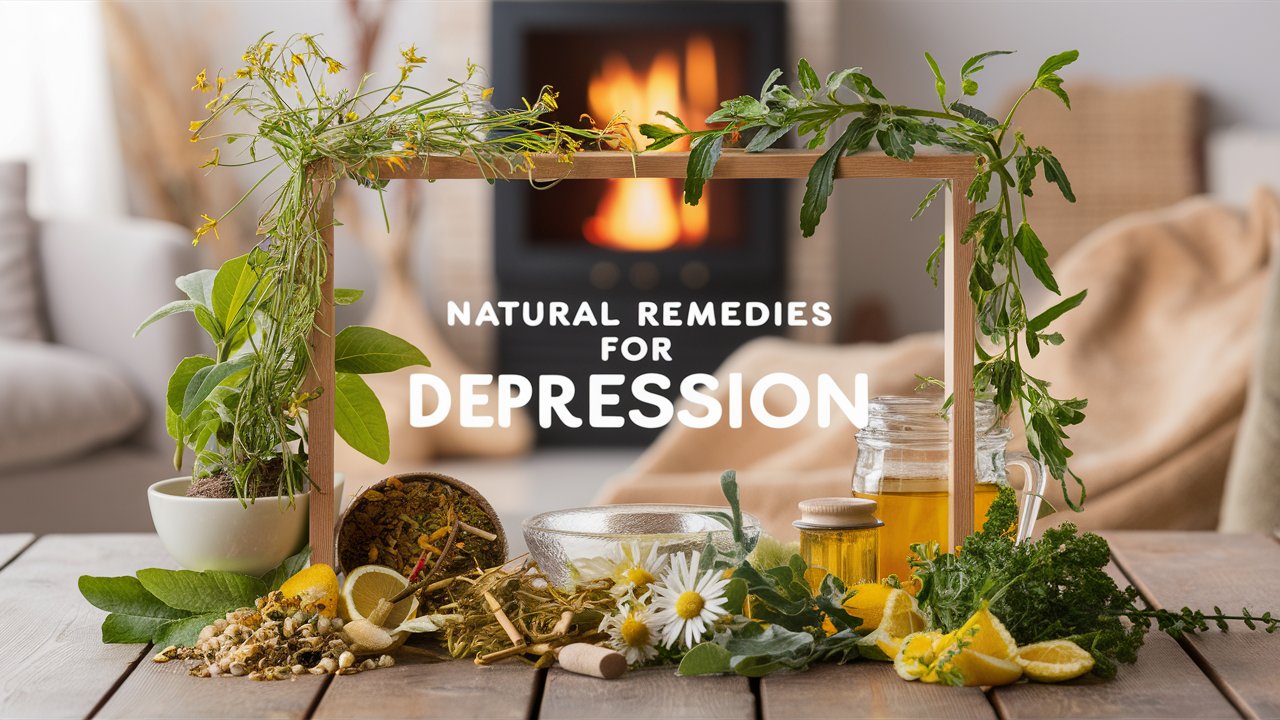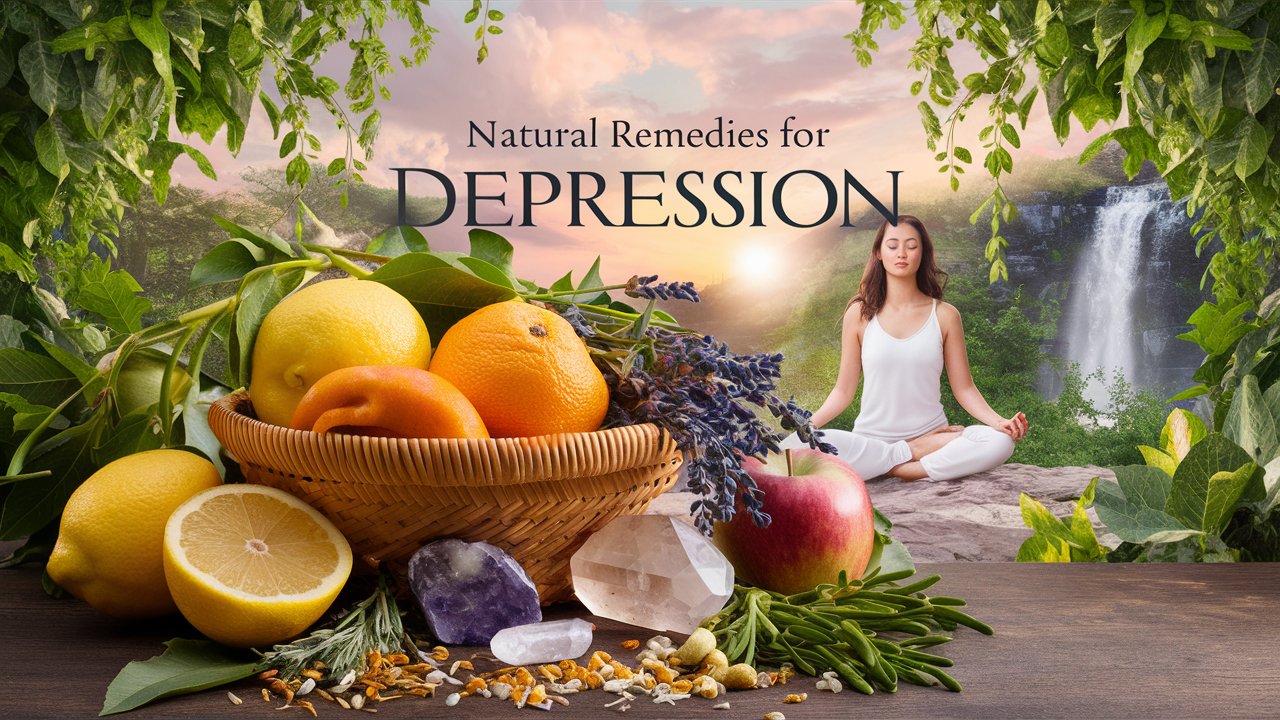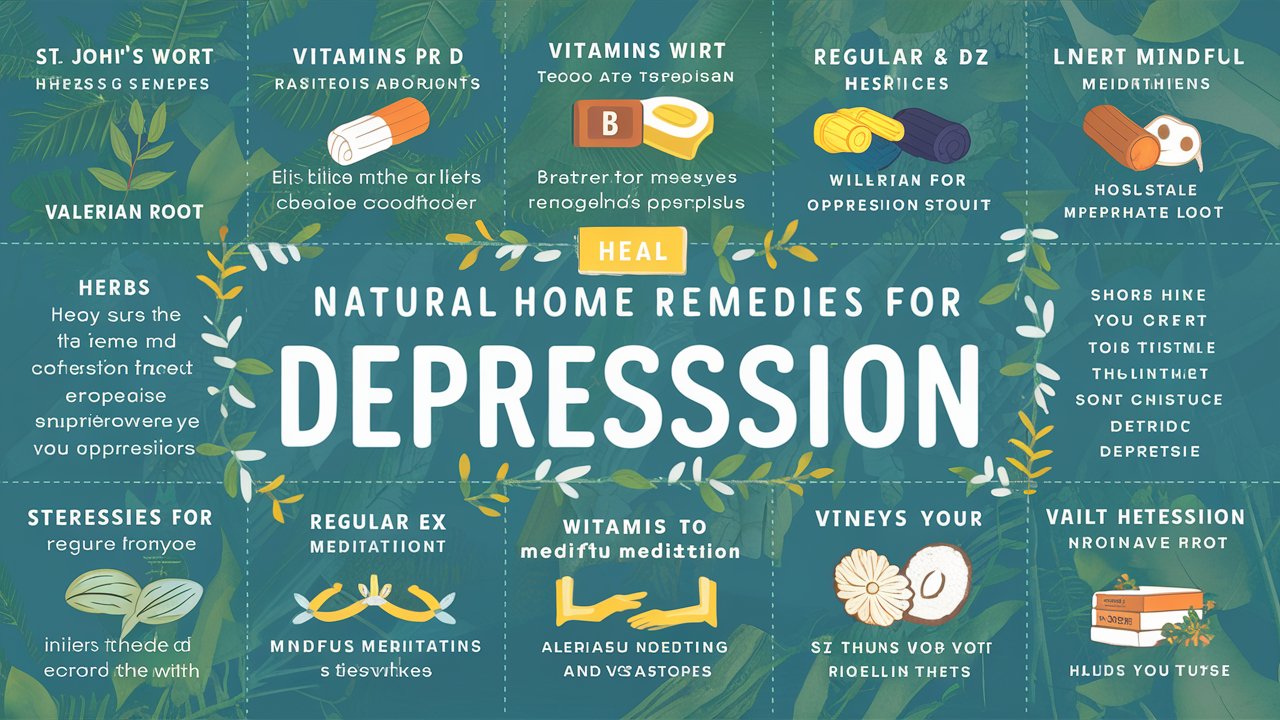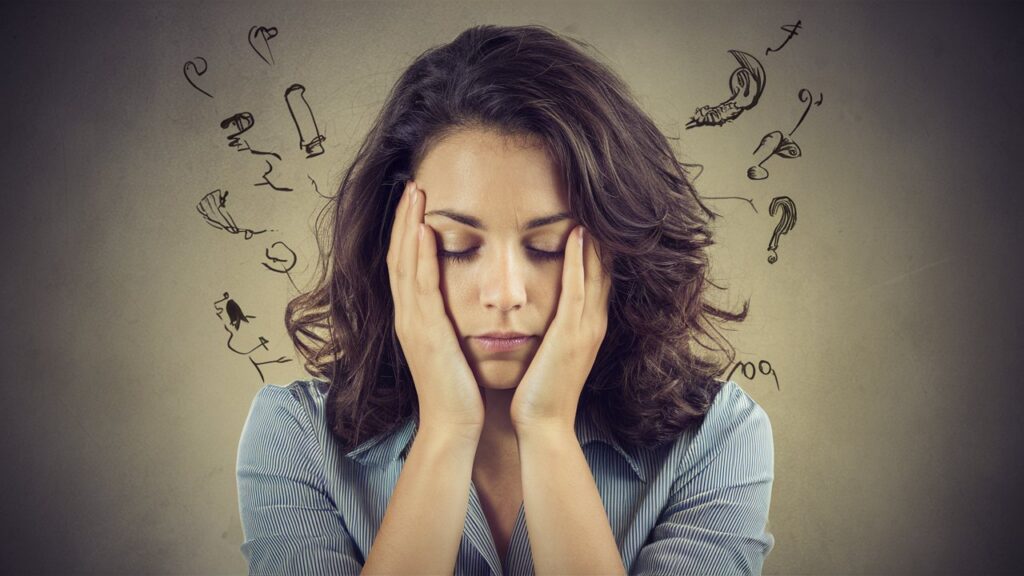Depression is one of the major issues in world health that causes millions of people to suffer. It can cripple a person; it may affect important areas in your life, from relationships to the work to the general sense of well-being. Though for most of the clients these traditional treatments through medications and psychotherapy are effective, it is not astonishing that what treatments are being searched for now are natural remedies, if not as supplements then maybe as an alternative. This paper will present some natural remedies for depression, the benefits derived from the use of the remedies, and how you can adopt them in your lifestyle to be sure of better mental health.
But before diving into the cures, one should be aware of what depression really is. It is not mere sadness or having a terrible day. It is an ongoing feeling of being sorry and a lack of interest that can cause many sorts of emotional and physical problems. The symptoms’ severity can be mild or severe, with regards to the following:
Persistent sad, anxious, or “empty” mood
Loss of interest or pleasure in hobbies and activities
Hopelessness or pessimism
Irritability
Insomnia or hypersomnia
Appetite, or weight changes
Fatigue and loss of energy
Difficulty concentrating, remembering, making decisions
Thoughts of death or suicide
The symptoms must be present for two weeks consistently, for the diagnosis of depression.
The Science Behind Natural Remedies
Generally, natural remedies consider approaches to lifestyle and holistic ways of considering mental health. All the treatments are grounded on the understanding that our well-being in terms of mental health very much depends on the physical condition, nutrition, level of activity, rest, and on such spheres of influence as social connections. Accordingly, turning to this or that sphere of influence, a person can make it possible to become the foundation for improving mental health.

1. Nutrition and diet Remedies
As the saying goes, the food we eat is the very foundation of one’s physiology, and that includes our brain, dysfunctional or otherwise. However, some nutrients have been observed to play a significant role in brain function and improvement in mood.
Omega-3 Fatty Acids
Omega-3 fatty acids are contained in some foods like salmon, trout, sardines, flax-seeds, chia seeds, and walnuts. They are very vital for the brain. The omega-3 levels were correlated with a high risk of new-onset case of depression with already low levels. These fatty acids form the basic foundation of the cell membrane within the brain and help to act against depression due to their anti-inflammatory characteristics.
b Vitamins
More specifically, B6, B12, and folic acid have been associated with brain health. They are all implicated in both the construction and regulation of neurotransmitters, the body’s chemical messengers in the brain. Deficiency states of each have been correlated to depression. Foods high in B vitamins include dairy, eggs, leafy greens, and legumes.
Magnesium is an essentially important mineral in the human body. It participates in other functions such as nerve function and mood control. Low levels of magnesium have been associated with depression. Food sources include common dark green leafy vegetables, nuts and seed products, and whole grains.
Personal Anecdote: A Diet Transformation
A few years ago, I went very deep into depression. I really never believed that diet could make a change in mental health, yet I tried it anyway. So, at first, I started eating a bit more of the foods rich in omega-3s and leafy greens consistently. Over the course of a few weeks, I started to feel a better change in my mood and energy levels. It was not all-encompassing, but it did get my road to recovery started off right.

2. Exercise
Exercises are also among the most effective natural remedies for depression. Exercises increase the discharge of endorphins, some chemicals within the brain that may kill pain and lighten up mood. Exercises allow proper sleeping, reducing stress, and making a person feel good about his or her self.
Types of Exercises
Aerobic Exercise: It causes your heart to pump and incorporate endorphins into your body. Aim to participate in at least 30 minutes of moderate exercise on most days of the week.
Strength Training: Lifting weights or working through body-weights exercise can help in this department by raising your level of serotonin, dopamine, and norepinephrine.
Yoga and Tai Chi: These are exercises that include body movement with a focus on awareness and breathing in order to achieve a mind-body combination, which will be useful in reducing stressors and increasing relaxation. Personal Story: The Power of Motion
It was exercise that pulled me through the darkest period of my life, an overwhelming bout of depression. I started by walking around the block, graduated to two blocks, and eventually worked up to jogging. Ironically, this physical activity more and more frequently worked like almost a form of meditation, clearing my mind and elevating my mood. No amount of exercise took the depression away, but it made itself one of the tools that took the edge off.
3. Sleep
Good sleep is how one could maintain good mental health. Poor sleep might harden the symptoms of depression, whereas adequate sleep—enhanced mood and overall well-being.
Tips to Improve Sleep
Stick to a Routine: Have a regular time for sleep and wake up daily. Even during weekends, stick to this routine.
Make It Comfortable in the Bedroom: Ensure that the bedroom is dark, perfectly quiet, and cool. Use darkening curtains and white noise machines.
Avoid Screen Time: No screens of any kind for at least an hour before you sleep. The blue light from the screens prevents melatonin generation—an important hormone that regulates sleep.
Avoid Caffeine and Alcohol: These can disrupt the sleep cycle and your quality of sleep.
Personal Story: Sleeping Again
At some point, my depression used to be the only thing strong enough that it wouldn’t let me get a good rest. I was lying there for hours, so it was just impossible to shut my mind down. In the morning, I couldn’t get up; I was too exhausted. Finally, some kind of bedtime routine and creating a perfect sleep environment really helped. Sleep slowly began to improve, and with it, so did energy and mood during the day.
4. Mindfulness and Meditation
Mindfulness and meditation clear the cluttered and jumbled thoughts in one’s mind by focusing his attention; these shall reduce stress and enhance your mood.
Advantages of Mindfulness and Meditation
Reduced Stress: Meditations can reduce the degree of stress hormone cortisol. It has symptoms similar to reducing depression.
Better Focus and Concentration: Exercises of mindfulness increase attention and cognitive flexibility.
Increases Self-Awareness; Yoga and meditation practices place much focus on increased self-inquiry. They, therefore tend to promote emotional well-being.
Types of Meditation
Mindfulness Meditation: This is a practice that trains the mind in fostering awareness of thoughts and feelings without judgment
Loving-Kindness Meditation: brings up increased feelings of Compassion and Love towards oneself and others
Body Scan Meditation: This is the exercise whereby an individual focuses his attention on the various parts of his body. This then relieves muscle tension and thus releases the tension that accumulates in the body.
Personal Anecdote: Journey Within.
Meditation soon became my haven in times that were hard-fought in battle with depression. It was but five minutes per day and grew into bigger moments after getting used to doing the exercise. With those mindfulness techniques, I could be more in control of my thoughts and be composed and clear-headed throughout every day.
5. Herbal Supplements
Some herbs are said to improve one’s mood. Be sure to ask your doctor about a new additive to your treatment because it can react with other medications you are on.
St. John’s Wort
St. John’s Wort is among the herbal supplements commonly used to cure depression. In relation, St John Wort can increase the levels of serotonin, dopamine, and norepinephrine in the brain, hence it manages to work. However, its use has got some precautions since it interacts with other medications.
Saffron
Saffron has been proven to have antidepressant effects. In fact, research proved that it is as effective as at times conventional antidepressants. One can add saffron to food or even take it as a supplement.
SAM-e Remedies
S-adenosylmethionine is an active molecule derived from the body which plays a primary role in the synthesis of neurotransmitters. Supplementation with SAMe has been used to elevate mood and decrease symptoms of depression.
6. Social connections Remedies
Social support helps in managing mental well-being. People have supportive friends because isolation brings depression, and supportive friends give a person the feeling of soothing and being secure during stressful moments.
Build a Support Network Remedies
Attempt to Reach out: Do not hesitate to say what is in your heart to friends or family. You shall be surprised at the good one gets from sharing their feelings.

Join Support Groups Reaching out and joining support groups can instill in you a feeling whereby you will feel part of a community that can understand your plight. By helping others, one can get their spirits lifted and even experience fulfillment. Personal Anecdote: The Power of Support.
At one stage of the worst phase of my life, I abandoned the lives of all my friends and family because I believed I was acting as a burden to all of them. Later, after finally reaching out, I came to know that I had ‘loads’ of support from everyone else. To talk about my struggles reduced a lot of burden by making me feel that I am not all alone.
Self-expression:
These creative activities turn into a powerful way of expression for a number of emotions and stressors. Be it painting, writing, playing music, or anything creative, mostly it brings feelings of satisfaction and even happiness.
Creative Outlets as a Form of Expression
Emotional Outlets: Everything one will not be able to express by word; through creativity, it allows letting out deep feelings.
Reduces Stress: Creative activities can perhaps allow involvement in mindfulness by anyone, thus helping reduce the accumulation of stress and anxiety. Lifts Mood: Making something, in general, will enhance your mood and bring satisfaction. Personal Anecdote: The Joy of Creativity.
I came back into the habit of painting when I was struck for the first time in life by the serious downness of depression. Pouring emotions onto the canvas actually has been therapeutic, for anything for that matter, which gives me the urge to do anything. It gives me in this world perhaps the sole sense of purpose that anything is getting from me. Of course, it didn’t cure my depression, although it’s been part of the joyful and meaningful times in my life.
Conclusion
An integrated approach to mental health is where natural remedies for depression show their real value. This forms an important additional support and is definitely not a means to replace traditional treatments. Definitely speak with a health professional before you make any major alteration in the treatment plan. Concentrate on basics that pay better dividends: diet, exercise, sleep, mindfulness, sociability, and creativity.








